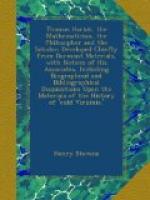It is not our purpose here to dwell upon Raleigh’s masterpiece. From the preface of the History of the World, which opens with ’the boundless ambition of mortal man,’ to the epilogue which closes up the work with the glorious triumph of Death, the whole book is replete with lessons of wisdom and warning. No one can rise from its perusal without perceiving that the modern author has made himself by apt illustration an accomplished actor in ancient history, while the ancient characters are made in their vera effigies to strut on modern stages. His pictures of great actions and great men, noble deeds and nobler princes, are drawn with such masterly perspective of truth, that they serve for all time ; while his portraiture of tyrants, villains, and dishonorable characters are no less lifelike and human. One marvels not therefore that King James, whose political creed was that the people are bound to princes by iron, and princes to the people by cobwebs, should see in Raleigh’s portraiture of the upright kings no likeness to himself, but had no difficulty in recognizing in the deformed greatness and selfish virtues of the old monarchs qualities suggestive of himself and his favorites. This grand history, extending from the creation over the four great monarchies of the world, near four thousand years, closes with the final triumph of Emilius Paullus in these memorable and oft-repeated words from the first edition of 1614.
Kings and Princes have alwayes laid before them, the actions, but not the ends, of those great Ones which precededthem. They are alwayes transported with the glorie of the one, but they never minde the miserie of the other, till they finde the experience themselves. They neglect the advice of God, while they enioy life, or hope it; but they follow the counsell of Death, upon his first approach. It is he that puts into man all the wisdome of the world, without speaking a word ; which God with all the words of His Law, promises, or threats, doth not infuse. Death which hateth and destroyeth man, is beleeved ; God, which hath made him and loves him, is alwayes deferred. I have considered, saith Solomon, all the workes that are under the Sunne, and behold, all is vanitie and vexation of spirit: but who beleeves it, till Death tells it us. It was Death, which opening the conscience of Charles the fift, made him enjoyne his sonne Philip to restore Navarre ; and King Francis the First of France, to command that justice should be done upon the murderers of the Protestants in Merindol and Cabrieres, which till then he neglected. It is therefore Death alone that can suddenly make man know himselfe. He tells the proud and insolent, that they are but Abjects, and humbles them at the instant ; makes them crie, complaine, and repent; yea, even to hate their forepassed happinesse. He takes the account of the rich, and proves him a beggar, a naked begger, which hath interest in nothing, but in the grauell that filles his mouth. He holds a glasse before the eyes of the most beautifull, and makes them see therein their deformitie and rottennesse; and they acknowledge it.




